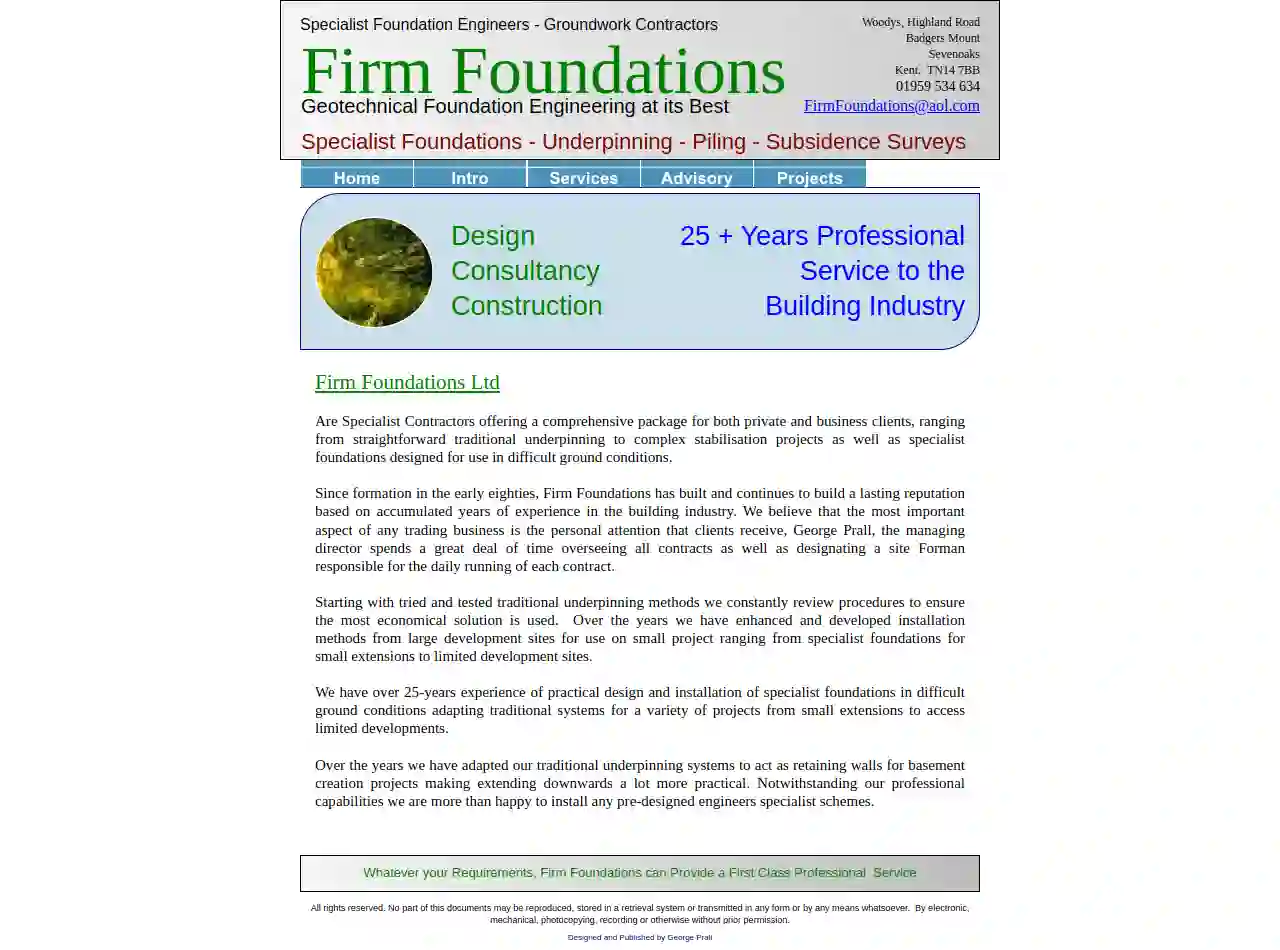Dirt Contractors Sevenoaks
Top 10 Dirt Contractor in Sevenoaks
Receive 3 FREE Dirt Contractors quotes for your project today! Compare profiles, reviews, accreditations, portfolio, etc... and choose the best offer.

Simon King Construction Ltd
51 reviewsSevenoaks, GBSimon King Construction Ltd is a successful firm of traditional high quality builders operating in Sevenoaks and the surrounding area. As home extension and re-modelling specialists, we bring together a wealth of experience and expertise on every size of project, united with strong customer-focused principles. Established in 1986, Simon King prides itself on delivering on its promises, a fact testified over the years by many satisfied customers. Happy to work with your own architect or we can recommend skilled local architects for you to consider. From a simple rear extension to a complete re-build, Simon King will give your project the care and attention it needs. If you are looking for expert builders in Sevenoaks, look no further, please contact Simon King for more information on how we can help extend your home or with your construction project.
- Services
- Why Us?
- Gallery
Get Quote
Firm Foundations
51 reviewsWoodys, Highland Road, Badgers Mount, TN14 7BB, GBFirm Foundations Ltd Are Specialist Contractors offering a comprehensive package for both private and business clients, ranging from straightforward traditional underpinning to complex stabilisation projects as well as specialist foundations designed for use in difficult ground conditions. Since formation in the early eighties, Firm Foundations has built and continues to build a lasting reputation based on accumulated years of experience in the building industry. We believe that the most important aspect of any trading business is the personal attention that clients receive, George Prall, the managing director spends a great deal of time overseeing all contracts as well as designating a site Forman responsible for the daily running of each contract. Starting with tried and tested traditional underpinning methods we constantly review procedures to ensure the most economical solution is used. Over the years we have enhanced and developed installation methods from large development sites for use on small project ranging from specialist foundations for small extensions to limited development sites. We have over 25-years experience of practical design and installation of specialist foundations in difficult ground conditions adapting traditional systems for a variety of projects from small extensions to access limited developments. Over the years we have adapted our traditional underpinning systems to act as retaining walls for basement creation projects making extending downwards a lot more practical. Notwithstanding our professional capabilities we are more than happy to install any pre-designed engineers specialist schemes. Whatever your Requirements, Firm Foundations can Provide a First Class Professional Service 25 + Years Professional Service to the Building Industry
- Services
- Why Us?
- Gallery
Get Quote
Over 11,537+ Excavation Contractors on our directory
Our excavation experts operate in Sevenoaks & surrounding areas!
ExcavationHQ has curated and vetted the Best Excavation Contractors arround Sevenoaks. Find a trustworthy pro today.
Frequently Asked Questions About Dirt Contractors
- Plant Selection: Understanding your soil's pH and nutrient levels helps you choose plants that will thrive in those conditions.
- Fertilizer Recommendations: Soil tests reveal nutrient deficiencies, allowing you to apply appropriate fertilizers to meet plant needs.
- Soil Amendments: Identify soil imbalances, such as compaction or high clay content, and recommend amendments to improve soil structure and drainage.
- Construction Projects: Assess soil bearing capacity and other properties to ensure the stability and safety of foundations and other structures.
- Environmental Assessments: Detect potential soil contamination and determine the need for remediation.
- Project Scope: The size and complexity of the project, including the volume of dirt to be moved, the distance for hauling, and the type of services required.
- Dirt Type: Different dirt types have varying costs based on availability and demand. Topsoil is typically more expensive than fill dirt.
- Location: Costs may differ depending on the contractor's location and the accessibility of the project site.
- Equipment Needed: Specialized equipment, such as excavators, bulldozers, or dump trucks, can influence the overall cost.
- Labor Costs: The number of workers and their hourly rates will affect the labor portion of the cost.
- Excavators: Versatile machines with a digging arm and bucket, used for excavation, trenching, loading trucks, and demolition.
- Bulldozers: Heavy machines with a large blade at the front, used for pushing and moving dirt, clearing land, and grading.
- Skid Steers: Compact, versatile machines with various attachments, including buckets, forks, and augers, used for digging, loading, grading, and more.
- Dump Trucks: Heavy-duty trucks designed for hauling dirt, gravel, and other bulk materials. Sizes vary based on carrying capacity.
- Graders: Machines with a long blade used for precise leveling and shaping of land surfaces, often used for road construction and site preparation.
- Compactors: Equipment used to compress soil, including plate compactors, rollers, and vibratory tampers, essential for achieving soil stability.
What is a soil test, and why is it important?
How much does it cost to hire a dirt contractor?
What are some common dirt contracting equipment?
What is the difference between topsoil and fill dirt?
Topsoil: The uppermost layer of soil, characterized by its rich organic matter content, nutrients, and dark color. It's essential for supporting plant growth and is commonly used for gardening, landscaping, and lawn establishment.
Fill Dirt: Primarily composed of subsoil or excavated materials, generally lacking the organic matter and nutrients found in topsoil. It's typically less fertile and used for structural purposes, such as filling in low areas, leveling ground, or creating raised beds.
Understanding the difference between topsoil and fill dirt is crucial for choosing the appropriate soil type for your specific project needs.
What is a soil test, and why is it important?
- Plant Selection: Understanding your soil's pH and nutrient levels helps you choose plants that will thrive in those conditions.
- Fertilizer Recommendations: Soil tests reveal nutrient deficiencies, allowing you to apply appropriate fertilizers to meet plant needs.
- Soil Amendments: Identify soil imbalances, such as compaction or high clay content, and recommend amendments to improve soil structure and drainage.
- Construction Projects: Assess soil bearing capacity and other properties to ensure the stability and safety of foundations and other structures.
- Environmental Assessments: Detect potential soil contamination and determine the need for remediation.
How much does it cost to hire a dirt contractor?
- Project Scope: The size and complexity of the project, including the volume of dirt to be moved, the distance for hauling, and the type of services required.
- Dirt Type: Different dirt types have varying costs based on availability and demand. Topsoil is typically more expensive than fill dirt.
- Location: Costs may differ depending on the contractor's location and the accessibility of the project site.
- Equipment Needed: Specialized equipment, such as excavators, bulldozers, or dump trucks, can influence the overall cost.
- Labor Costs: The number of workers and their hourly rates will affect the labor portion of the cost.
What are some common dirt contracting equipment?
- Excavators: Versatile machines with a digging arm and bucket, used for excavation, trenching, loading trucks, and demolition.
- Bulldozers: Heavy machines with a large blade at the front, used for pushing and moving dirt, clearing land, and grading.
- Skid Steers: Compact, versatile machines with various attachments, including buckets, forks, and augers, used for digging, loading, grading, and more.
- Dump Trucks: Heavy-duty trucks designed for hauling dirt, gravel, and other bulk materials. Sizes vary based on carrying capacity.
- Graders: Machines with a long blade used for precise leveling and shaping of land surfaces, often used for road construction and site preparation.
- Compactors: Equipment used to compress soil, including plate compactors, rollers, and vibratory tampers, essential for achieving soil stability.
What is the difference between topsoil and fill dirt?
Topsoil: The uppermost layer of soil, characterized by its rich organic matter content, nutrients, and dark color. It's essential for supporting plant growth and is commonly used for gardening, landscaping, and lawn establishment.
Fill Dirt: Primarily composed of subsoil or excavated materials, generally lacking the organic matter and nutrients found in topsoil. It's typically less fertile and used for structural purposes, such as filling in low areas, leveling ground, or creating raised beds.
Understanding the difference between topsoil and fill dirt is crucial for choosing the appropriate soil type for your specific project needs.